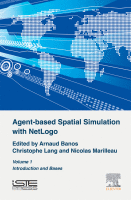Browse content
Table of contents
Actions for selected chapters
- Full text access
- Book chapterAbstract only
1 - Introduction to the Agent Approach
Fabrice Bouquet, Sébastien Chipeaux, ... Patrick Taillandier
Pages 1-28 - Book chapterAbstract only
2 - Description Formalisms in Agent Models
Fabrice Bouquet, David Sheeren, ... Claude Monteil
Pages 29-73 - Book chapterAbstract only
3 - Introduction to NetLogo
Frédéric Amblard, Eric Daudé, ... Patrick Taillandier
Pages 75-123 - Book chapterAbstract only
4 - Agent-Based Model Exploration
Arnaud Banos, Philippe Caillou, ... Nicolas Marilleau
Pages 125-181 - Book chapterAbstract only
5 - Dynamical Systems with NetLogo
Nathalie Corson and Damien Olivier
Pages 183-221 - Book chapterAbstract only
6 - How to Involve Stakeholders in the Modeling Process
Nicolas Becu, Frédéric Amblard, ... Nicolas Marilleau
Pages 223-252 - Book chapterNo access
Bibliography
Pages 253-264 - Book chapterNo access
List of Authors
Frédéric Amblard, Arnaud Banos, ... Patrick Taillandier
Pages 265-266 - Book chapterNo access
Index
Pages 267-268
About the book
Description
Agent-based modeling is a flexible and intuitive approach that is close to both data and theories, which gives it a special position in the majority of scientific communities. Agent models are as much tools of understanding, exploration and adaptation as they are media for interdisciplinary exchange. It is in this kind of framework that this book is situated, beginning with agent-based modeling of spatialized phenomena with a methodological and practical orientation.
Through a governing example, taking inspiration from a real problem in epidemiology, this book proposes, with pedagogy and economy, a guide to good practices of agent modeling. The reader will thus be able to understand and put the modeling into practice and acquire a certain amount of autonomy.
Agent-based modeling is a flexible and intuitive approach that is close to both data and theories, which gives it a special position in the majority of scientific communities. Agent models are as much tools of understanding, exploration and adaptation as they are media for interdisciplinary exchange. It is in this kind of framework that this book is situated, beginning with agent-based modeling of spatialized phenomena with a methodological and practical orientation.
Through a governing example, taking inspiration from a real problem in epidemiology, this book proposes, with pedagogy and economy, a guide to good practices of agent modeling. The reader will thus be able to understand and put the modeling into practice and acquire a certain amount of autonomy.
Key Features
- Featuring the following well-known techniques and tools: Modeling, such as UML, Simulation, such as the NetLogo platform, Exploration methods, Adaptation using participative simulation
- Featuring the following well-known techniques and tools: Modeling, such as UML, Simulation, such as the NetLogo platform, Exploration methods, Adaptation using participative simulation
Details
ISBN
978-1-78548-055-3
Language
English
Published
2015
Copyright
Copyright © 2015 Elsevier Ltd. All rights reserved.
Imprint
ISTE Press - Elsevier
